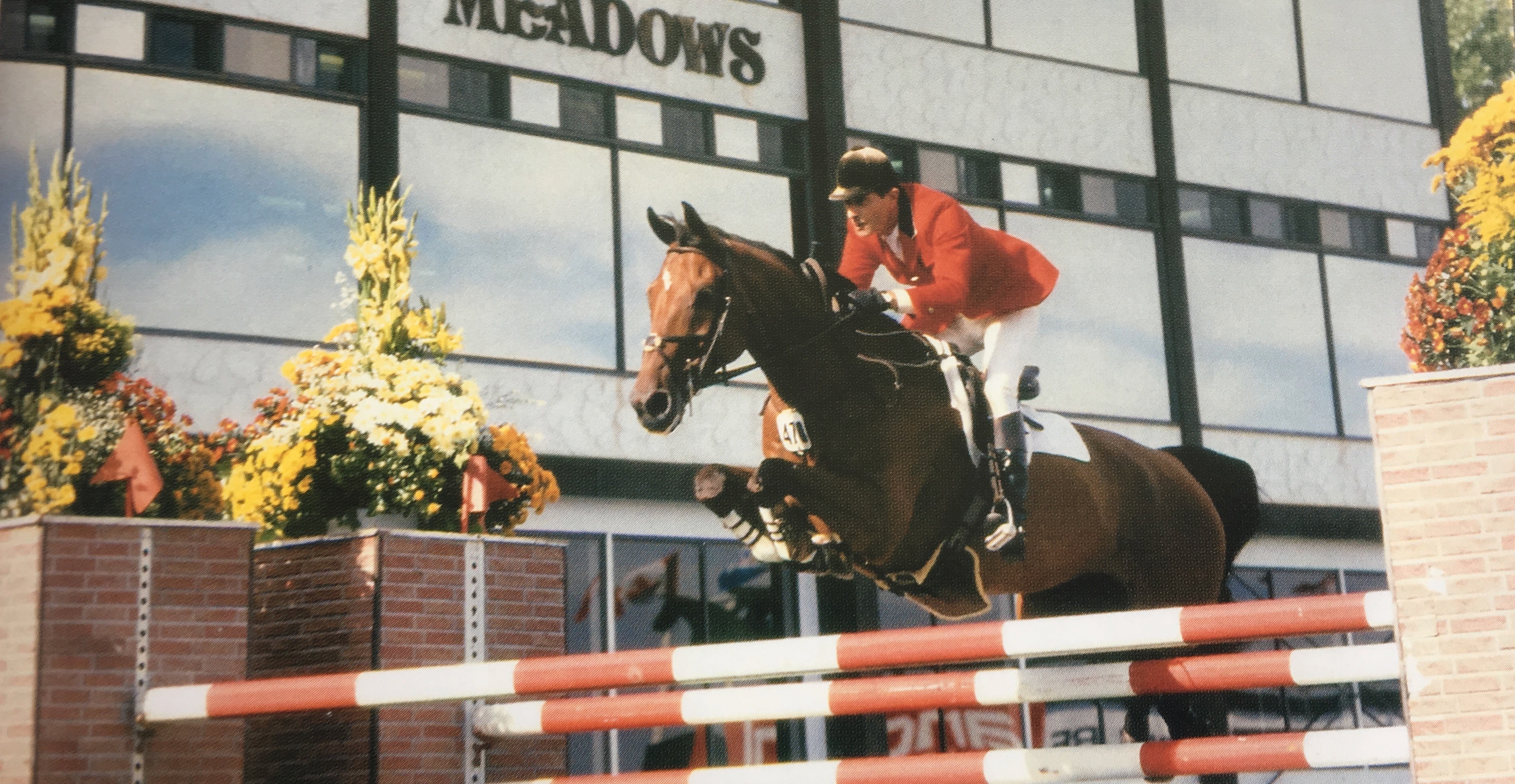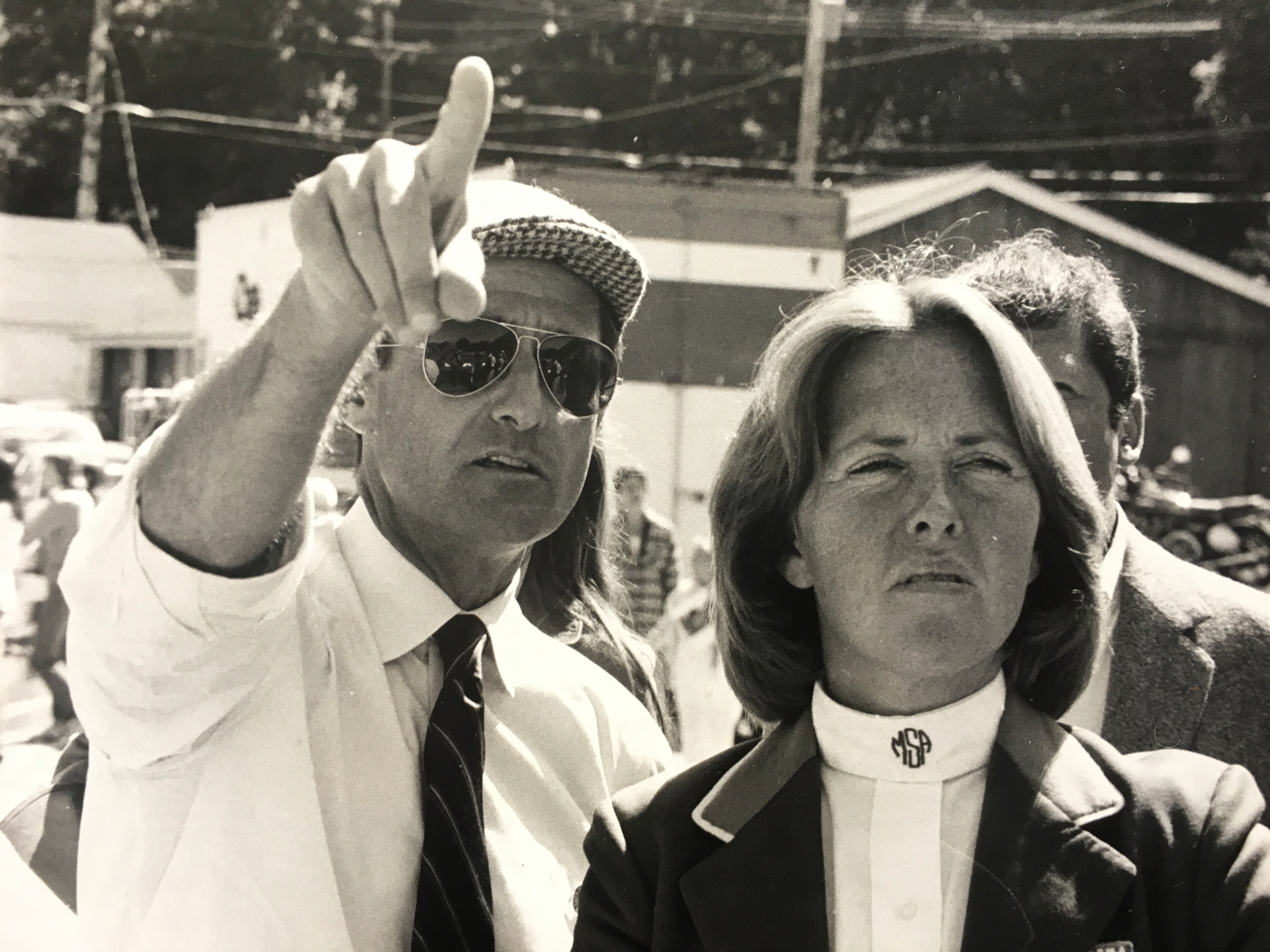I arrived in West Palm Beach, Florida, and headed straight from the airport to George Morris’ home in Wellington in early January to interview him for Practical Horseman’s new podcast. I was nervous for two reasons: First, even though George and I have worked together on stories and other editorial projects for 24 years, I am still in awe of him and don’t want to make any silly mistakes. Second, George was only my second podcast interview, so the process and the equipment were still new to me.
Shortly after 5 p.m., George, a world-renowned hunter/jumper rider, trainer, and coach, invited me into a den-like room off the kitchen that had built-in shelves filled with books, many of them riding books, he later said. Also on the walls as well as on various side tables were photographs of the many horses in his life and a who’s who in the riding world of his mentors, contemporaries and students. In hindsight, I wish I’d spent more time looking at the photos, but I was trying to be mindful of George’s time.

The interview began slightly awkwardly because I was using my phone to record the interview and a hand-held microphone. As I handed George the microphone after my introduction and first question, the phone clattered to the ground because the microphone cord was too short—the dreaded silly mistake!
But after that, George and I spoke for more than two hours. I found myself relaxing as I became more engrossed in his answers to my questions. In a nutshell, our conversation was a journey through his life and the insights he has learned. We touch on several topics from his early years as a timid rider, to his love of dressage, to the American Forward riding system. He discusses the challenges he sees in today’s sporthorse industry, shares one exercise he thinks riders need to work on more and speaks fondly about favorite horses, including one who was a catalyst for a competitive-riding comeback in the 1980s.

Here are just a few excerpts from our conversation:
Q: What impact did Gordon Wright have on your riding?
GM: … I was a naturally timid rider. … I [had been] innocently overfaced so I really lost my nerve. … Gordon kept me at a standstill the first lesson. We didn’t walk. He positioned my leg, he positioned my hands, he showed me two-point contact, three-point contact. … He kept me very slow. But that was Gordon’s system, very slow. …
On spending two years acting in the Neighborhood Playhouse in the early 1960s:
GM: It was the best thing that ever happened to me because I could not speak in public before that I was so nervous. I’m still nervous. When I teach or do this interview or give clinics or lessons, I’m still nervous, but I do it because I was taught to do it.”
Q: Why do you feel dressage in important?
GM: … Slow work, or dressage, is the basis for conditioning a horse. It’s like going to the gym. You want to go to the gym correctly. It’s the same thing. Physically it conditions the horse correctly. Mentally, it relaxes the horse. Emotionally, itmakes him feel better. … Luckily I was brought up thinking like that. I’m more convinced than ever, when I see how people work horses today, strapping their heads down, force, force, force, vets, vets, vets, injections, injections, injections, horses are more dispensable today to people. They aren’t worked well. Not all. … There are some who work them beautifully. The majority of people don’t work them correctly. They don’t gymnasticize them. And that’s ancient. That’s not some secret. … There’s not much horse welfare when you see how people work horses.
Q: In the clinics that you’re teaching, what are some challenges you’re seeing riders facing today?”
GM: More icing, less cake. That is they look the part, they dress the part, they have horses for the part, they horse show for the part, but … I know how to see through them in a heartbeat. I know to ask a question to expose them. It takes me not 30 seconds. Two seconds. … The cake is the work, the cake is the basic work, day after day, month after month, year after, year. All aspects of horsemanship.
Q: Do you have a favorite exercise?
GM: I would say what is neglected, is what is called two points of contact, where the rider at a standstill, walk, trot, canter, gallop stands slightly out of the saddle. Some trainers overdo it. Overdo it will put you ahead of your horse. Underdo it will put you behind your horse. Without two-point contact, you put an educated grip in a rider’s leg. That is his heels are well down, his ankles flexed, his toes out a shade, his calf in contact with the horse.
Q: What’s one thing people don’t know about you that you would want you to know?
GM: I’m a Pisces and Pisces are two fish, two people swimming in opposite directions. I am totally two people swimming in opposite directions. I am very conscientious. I’m a workaholic. I’m very conservative and yet on the other hand, I’m just the opposite. … Not all of me, but I’m a free spirit. … I’m a doubter, I’m always a doubter. … I doubt that I can do this interview, I doubt tomorrow I can ride well, these horses I worked. I doubt ‘Is that the right-hand position? Now I don’t understand the rein aid,’ so I go back to all these books and read about rein aids. ‘Well I’m saturated with my German direction, I’m now going to go in the French direction. No I’m too much French, I’m going to go back to German.’ No I’m a doubter. I’m a worrier. I’m a major worrier.”
On why George is so strict in clinics:
GM: Don’t try to tamper with my teaching because you’re tampering with safety. I would rather retire, not teach, ride at all rather than compromise my standards, what I was taught and what I did and I what I’ve produced. I’m not changing.

Here is a more comprehensive look at what you’ll hear in the podcast:
• His stint as a stage actor
• His one regret of not being able to pursue competitive dressage
• How he’s lived with both physical and mental fear—the fear of making a mistake
• The challenges he sees in today’s sporthorse industry—he thinks that people don’t take the time to care for their horses.
• Why he feels strongly about two-time Olympic gold medalist Beezie Madden taking over the reins of Practical Horseman’s Jumping Clinic column after he retired from it last year.
• The exercise he sees most hunter/jumper riders needing to work on as he teaches clinics across the country—two point.
• His favorite horses
ABOUT GEORGE MORRIS:
George earned early fame in the hunter/jumper world by winning the ASPCA Maclay National Championships and the American Horse Shows Association Hunt Seat Medal Final in 1952 when he was just 14 years old. He then went on to ride on eight winning Nations Cup teams between 1958 and 1960. Also in 1960, he won the prestigious Grand Prix of Aachen on Night Owl and helped bring home the show-jumping silver medal at the Rome Olympics on Sinjon.
His former students include many of today’s most successful riders such as Leslie Burr Howard, Katie Monahan Prudent, Conrad Homfeld, Melanie Smith Taylor and Chris Kappler. His coaching duties include serving as the co-chef d’équipe of the U.S. silver-medal show-jumping team at the 1996 Atlanta Olympics and the U.S. team at the 2000 Sydney Olympics. He also was chef of the U.S. team that earned team gold and individual bronze at the 2008 Olympics in Hong Kong.
His teaching philosophy has reached thousands of riders through the world in the books he has authored.
ABOUT THE PRACTICAL HORSEMAN PODCAST
The Practical Horseman podcast will run every other Friday, features conversations with respected riders, industry leaders and horse-care experts to inform and inspire listeners. It will be co-hosted by myself and Practical Horseman editors Emily Daily and Jocelyn Pierce. Join me again in two weeks, where you’ll hear my conversation with show-jumping great Margie Goldstein Engle. After that, our show includes talks with show-jumping Olympian Anne Kursinski, top hunter rider Liza Boyd as well as eventers Buck Davidson and Great Britain’s William Fox Pitt.
Please rate, review and subscribe to the podcast. You can subscribe and listen to our podcast on Apple Podcasts or iTunes, Stitcher and Soundcloud.






